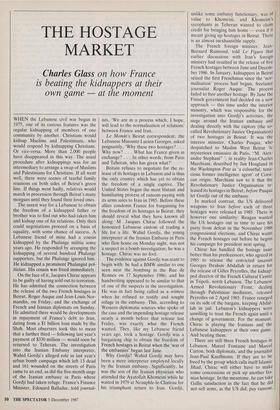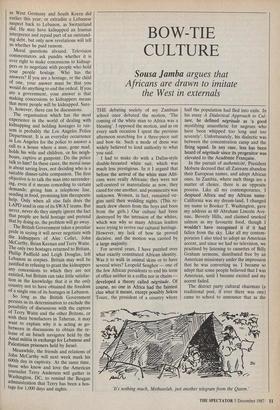THE HOSTAGE MARKET
Charles Glass on how France
is beating the kidnappers at their own game — at the moment
WHEN the Lebanese civil war began in 1975, one of its curious features was the regular kidnapping of members of one community by another. Christians would kidnap Muslims and Palestinians, who would respond by kidnapping Christians. Or vice-versa. More than 2,000 people have disappeared in this way. The usual procedure after kidnappings was for an intermediary to arrange a swap of Muslims and Palestinians for Christians. If all went well, there were scenes of tearful family reunions on both sides of Beirut's green line. If things went badly, relatives would march in procession through Beirut's many morgues until they found their loved ones.
The surest way for a Lebanese to obtain the freedom of a kidnapped father or brother was to find out who had taken him and kidnap one of his relations. Only then could negotiations proceed on a basis of equality, with some chance of success. A Lebanese friend of mine had a cousin kidnapped by the Phalange militia some years ago. He responded by arranging the kidnapping of several hundred Phalange supporters, but the Phalange ignored him. He kidnapped a prominent Phalangist pol- itician. His cousin was freed immediately.
On the face of it, Jacques Chirac appears to be guilty of having sold out to terrorism. He has admitted the connection between the release of the two French hostages in Beirut, Roger Auque and Jean-Louis Nor- mandin, on Friday, and the exchange of French and Iranian diplomats on Sunday. He admitted there would be developments in repayment of France's debt to Iran, dating from a $1 billion loan made by the Shah. Most observers took this to mean that a further third — following last year's payment of $330 million — would soon be returned to Teheran. The investigation into the Iranian Embassy interpreter, Wahid Gordji's alleged role in last year's urban bomb campaign which left 13 dead and 161 wounded on the streets of Paris came to an end, as did the five-month siege of the Iranian embassy in Paris where Gordji had taken refuge. France's Finance Minister, Edouard Balladur, told journal-
ists, 'We are in a process which, I hope, will lead to the normalisation of relations' between France and Iran.
Le Monde's Beirut correspondent, the Lebanese Maronite Lucien Georges, asked poignantly, 'Why these two hostages? . . . Why now? . . . What has France given in exchange? . . . In other words, from Paris and Teheran, who has given what?'
Britain refuses to negotiate for the re- lease of its hostages in Lebanon and is thus the only country which has yet to obtain the freedom of a singly captive. The United States began the most blatant and humiliating process of ransom-paying with its arms sales to Iran in 1985. Before these allies condemn France for bargaining for the freedom of its hostages in Beirut, they should reveal what they have known all along: M. Jacques Chirac followed the honoured Lebanese custom of trading a life for a life. Wahid Gordji, the young interpreter at the Iranian Embassy in Paris who flew home on Monday night, was not a suspect in a bomb investigation; he was a hostage. Chirac was no fool.
The evidence against Gordji was scant to begin with: he had a BMW similar to one seen near the bombing in the Rue de Rennes on 17 September 1986; and his handwriting appeared to be similar to that of one of the suspects in the investigation. He was in fact being called as a witness when he refused to testify and sought refuge in the embassy. This, according to Western diplomatic sources who spoke of the case and the impending hostage release nearly a month before that release last Friday, was exactly what the French wanted. They, like my Lebanese friend years ago, took a hostage. Gordji was a bargaining chip to obtain the freedom of French hostages in Beirut when the 'war of the embassies' began last June.
Why Gordji? Wahid Gordji may have been a mere interpreter employed locally by the Iranian embassy. Significantly, he was the son of the Iranian physician who attended the Ayatollah Khomeini while he waited in 1979 at Neauphle-le-Chateau for his triumphant return to Iran. Gordji,
unlike some embassy functionary, was of value to. Khomeini, and Khomeini's sycophants in Teheran wanted to claim credit for bringing him home — even if it meant giving up hostages in Beirut. There is an almost inexhaustible supply.
The French foreign minister, Jean- Bernard Raimond, told Le Figaro that earlier discussions with Iran's foreign ministry had resulted in the release of five French hostages between June and Decem- ber 1986. In January, kidnappers in Beirut seized the first Frenchman since the 'nor- malisation' process had begun, freelance journalist Roger Auque. The process failed to free another hostage. By June the French government had decided on a new approach — this time under the interior ministry, which was responsible for the investigation into Gordji's activities, the siege around the Iranian embassy and dealing directly with the captors (the so- called Revolutionary Justice Organisation) of two hostages in Beirut. It was the interior minister, Charles Pasqua, who despatched to Muslim West Beirut 'le mysterieux emissaire de Paris, "M. Alex- andre Stephani" ', in reality Jean-Charles Marchiani, described by Jim Hoagland in the Washington Post as 'a colourful, tena- cious former intelligence agent' of Corsi- can origin. Marchiani saw to it that the Revolutionary Justice Organisation re- leased its hostages in Beirut, before Pasqua let Gordji out of the embassy.
In marked contrast, the US delivered weapons to Iran before each of three hostages were released in 1985. There is however one similarity: Reagan wanted the US hostages out in time to save his party from defeat in the November 1986 congressional elections, and Chirac wants the French hostages out before he begins his campaign for president next spring.
Chirac has handled the hostage issue better than his predecessors, who agreed in 1985 to release the convicted assassin Georges Ibrahim Abdallah in return for the release of Gilles Peyrolles, the kidnap- ped director of the French Cultural Centre in Tripoli, north Lebanon. The Lebanese Armed Revolutionary Front, dealing through Palestinian mediators, released Peyrolles on 2 April 1985. France reneged on its side of the bargain, keeping Abdal- lah in jail. Lebanon's kidnappers were unwilling to trust the French again until a change of government. For the moment, Chirac is playing the Iranians and the Lebanese kidnappers at their own game. And beating them.
There are still three French hostages in Lebanon, Marcel Fontaine and Marcel Carton, both diplomats, and the journalist Jean-Paul Kauffmann. If they are to be freed by the group which calls itself Islamic
Jihad, Chirac will either have to make some concessions or pick up another Ira-
nian hostage. In the meantime, he can take Gallic satisfaction in the fact that he did not sell arms, as the US did; pay ransom. as West Germany and South Korea did earlier this year; or extradite a Lebanese suspect back to Lebanon, as Switzerland did. He may have kidnapped an Iranian interpreter and repaid part of an outstand- ing debt, but only new revelations will tell us whether he paid ransom. Moral questions abound. Television commentators ask pundits whether it is ever right to make concessions to kidnap- pers or to negotiate with people who hold your people hostage. Who has the answers? If you are a hostage, or the child of one, your answer must be that you would do anything to end the ordeal. If you are a government, your answer is that making concessions to kidnappers means that more people will be kidnapped. Sure ly, however, there can be discussions.
The organisation which has the most experience in the world of dealing with kidnapping and holding hostages to ran- som is probably the Los Angeles Police Department. It is an everyday occurrence in Los Angeles for the police to answer a call to a house where a man, gone mad, holds his wife and children, or his neigh- bours, captive at gunpoint. Do the police talk to him? In these cases, the moral issue Is about saving lives, not deciding who is a suitable dinner-table companion. The first objective is to talk the man into surrender- ing, even if it means conceding to certain demands: giving him a telephone line, sending in food, promising him therapeutic help. Only when all else fails does the LAPD send in one of its SWAT teams. But never, never do they simply ignore the fact that people are held hostage and pretend that by doing so, the problem will go away. The British Government takes a peculiar pride in saying it will never negotiate with the kidnappers of Alec Collet, John McCarthy, Brian Keenan and Terry Waite. The only two hostages returned to Britain, Phillip Padfield and Leigh Douglas, left Lebanon as corpses. Britain may well be justified in refusing to grant the kidnappers any concessions to which they are not entitled, but Britain can take little satisfac- tion in the knowledge that it is the only country not to have obtained the freedom of a single one of its hostages in Lebanon. So long as the British Government persists in its determination to exclude the possibility of discussions with the captors of Terry Waite and the other Britons, or with their benefactors in Teheran, it may want to explain why it is acting as go- between in discussions to obtain the re- lease of an Israeli navigator held by the Amal militia in exchange for Lebanese and Palestinian prisoners held by Israel.
Meanwhile, the friends and relations of John McCarthy will next week mark his 600th day in captivity. At the same time, those who know and love the American journalist Terry Anderson will gather in Washington, DC, to remind the Reagan administration that Terry has been a hos- tage for 1,000 days and nights.











































































 Previous page
Previous page